Photographs: Reuters Mahesh Vijapurkar
India Inc has spoken about it being a path towards continued growth though they'd expected a bit of tweaking hither and yon, help them make more profitable, for what is good for them is naturally good for the country.
Some wondered if there was a bit of fudge since there was no bonanza in sight like what was raised by the 2G auctions to fund expenses and keep deficits in limits.
The views depended on the perches occupied -- par for the course, of course.
But what are my takeaways from the Budget 2011-2012?
Quite a lot, really.
There was an acknowledgement from the highest quarters, no less than the Prime Minister Manmohan Singh himself, that there was a need to "boost the delivery system" and that it was a problem big enough to be "faced head on".
It was no off-off the cuff remark but a sober confession made to T N Ninan in a post-budget interview on the Doordarshan.
That confession was gratifying, and one needs to thank Ninan for asking the right question.
. . .
Budget a harbinger of good things? Could be
Image: 46 per cent children are malnutritionedPhotographs: Reuters
He meant, in the context he said it, that the nuts and bolts of the delivery mechanisms need to be fixed. Sure, Mukherjee, they need fixing.
Remember we became a republic in 1950 and we are patient citizens, not subjects?
Among the post-budget voices, it was left only to the redoubtable Mani Shankar Aiyar who chose to be present in a television studio instead to amplify his points.
Inter alia, he said, the poor are left in the lurch. For instance, that despite decades of Integrated Child Development Scheme, 46 per cent of children continue to be in malnutrition; that increase allocations appear only to further feed the appetite of the corrupt; and that direct payments to mothers to have their deliveries attended to led to a 10-fold increase in attended deliveries.
In the last cited instance, there are no middlemen in the shape and form of petty bureaucrats.
. . .
Budget a harbinger of good things? Could be
Image: Media completely ignored aam aadmiPhotographs: Reuters
Those who were interviewed represented the middleclass voracious for the goodies they want cheap.
The aam aadmi to me is not them but the person who goes to work on a farm, lives in a slum, sends -- if he can manage to send -- his child to school that is dysfunctional, struggles to wrench his quota of items from the public distribution system and so on and so forth and finds the doctor absent in the primary health centre and medicines missing from the cupboards.
I think this budget for 2011-2012 could be a harbinger of good things, but conditions apply. There are indications of going forward on expanding the list of entitlements of the citizens.
By my reckoning, while presenting the previous budget, Mukherjee had used for the first time the word 'entitlements'.
This time, the future, Mukherjee has promised, would see direct cash transfers to people who buy kerosene instead of subsidy. Augurs well, which means we could be at the cusp of the long awaited change. Or, are we?
. . .
Budget a harbinger of good things? Could be
Image: Rising oil prices can hurt growthPhotographs: Reuters
There have been some reluctance to pay the minimum wage normally paid to the farmhand to be paid to the poor under the Mahatma Gandhi National Employment Guarantee Scheme, but at least they have indexed it now to the consumer price index, which is half a battle won.
But there are a whole lot of battles remain to be fought to realise everything that is promised.
Why is there some faint hope? Because, the budget presumes, hopefully rightly, if there is no glitch on the petroleum front given the situation in the Middle East, there would be growth - look at the continuity and stability in the budget; there are no new imposts.
The government can not devote time to governance, and simplifying life seems intended because those with salaried incomes of Rs. 5 lakh and less need not even file their returns.
This hope can be snuffed out if the government chooses to let the stuff written in the budget and read in the parliament just remain so much of ink on paper.
. . .
Budget a harbinger of good things? Could be
Image: Food stamps can stop black marketing of grainsPhotographs: Reuters
This pilot, if it works well because of the Aadhar - the unique identity system being developed and implemented by Nandan Nilekani - could well mean a whole set of changes.
Instead of PDS shops run by the rascals who have political patronage and divert food grains to the black markets and the kerosene for adulteration of petroleum products, we could well find food stamps.
The Right to Education could well lead to coupons the parents could use to decide where a student goes, regardless of the kind of school it is. But these need not just words but determination.
My argument pivots on the point Mukherjee made explicitly about the 'details' of governance mechanisms on Monday.
The crux, he admitted, was in the details of governance - on how the things proposed and promised are delivered.
That realisation has been long in coming, at least amongst those who govern but it is a good thing it did even Remember that P Chidambaram, when holding the Finance portfolio stressed on outcomes?
. . .
Budget a harbinger of good things? Could be
Image: People have to be alert of their rightsPhotographs: Reuters
An efficient administration ensure more bang for the same money - better outcomes without having to increase allocations which in turns means ease in balancing the budget.
We have not seen much action on that front. Not yet. Because, there is a long road to cover before we even start to make a difference.
But the optimist in me says the journey could have begun on February 28, 2011, most probably because the world's ruling class are beginning to understand that if in ruthless dictatorships people could raise in rebellion, those in democracies could too and easier than that.
There is, however, a caveat: the people have to be alert of their rights, which have been squandered by complacency of the citizens. It is as much to be blamed for the poor delivery of entitlements as the government's unwillingness to ensure their targeted deliveries.
So it is up to us to ensure the word is kept. Would we?
Mahesh Vijapurkar is a Thane-based commentator on public affairs.

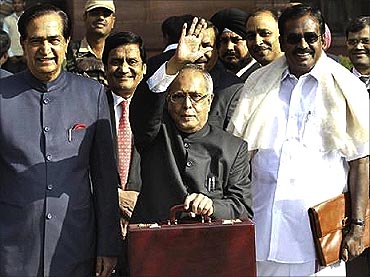

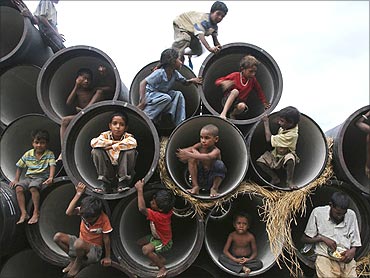
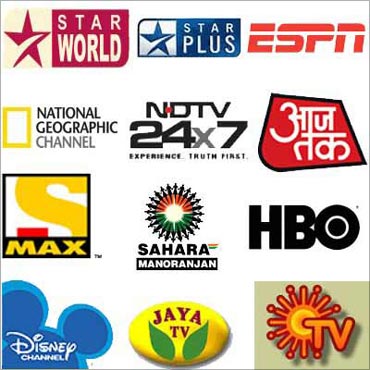

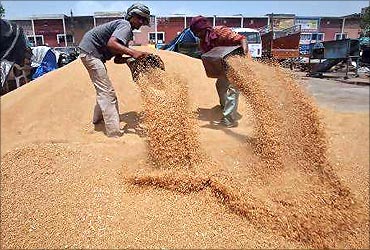
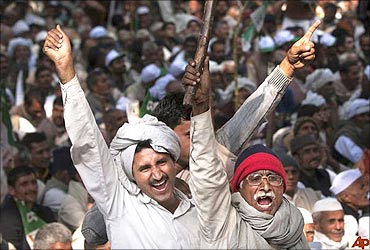
article